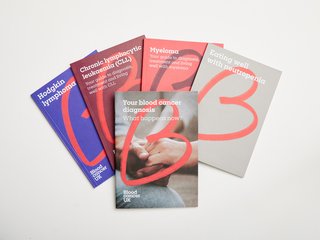ET treatment and side effects
Treatment for essential thrombocythaemia (ET) aims to manage the effects of the disease rather than cure it.
Understanding treatment for ET
Scientists are researching new and better treatments for ET, with the ambition to cure it. Until then, treatment is designed to control the symptoms and offer you a better quality of life.
Treatment for ET aims to lower your platelet count. This lowers your risk of blood clots, which can cause heart attack or stroke. All the treatments listed on this page can be taken at home and incorporated into your daily routine.
Treatment decisions
Your doctor will decide on your treatment based on your personal circumstances. They will consider:
- your age
- your level of risk for blood clots
- the number of platelets in your blood (your platelet count)
Your hospital team will discuss the treatment plan with you and take your wishes into account.
You may stay on the same treatment for a period of years. Your doctor will consider a new treatment if the one you’re having stops working as well, or causes serious side effects.
They may also suggest you take part in a clinical trial, which is an opportunity to try a new drug or combination of drugs that may be not available outside of the trial. You can read more about clinical trials.
"I’ve had different treatments over the years and they’ve kept the ET under control. If one option doesn’t work for you, there are others to try."
Gail, living with ET since 1991
Read Gail's story about living with ET for more than 30 years

Reducing the risk of blood clots
ET is a chronic (slow-growing) type of blood cancer and the main risk is from blood clots causing serious problems like heart attack and stroke.
Most people with ET are given medicine to reduce the risk of blood clots. These medicines can include:
If your overall risk of blood clots is low, for instance if you are younger and don’t have any other health conditions like diabetes or high blood pressure, your first treatment may be a low daily dose of aspirin. People sometimes call this baby aspirin.
Aspirin is an anti-platelet medicine – it does not lower the number of platelets in your blood but makes the platelets less sticky. This in turn lowers your risk of blood clots. It is taken either as a capsule or as a tablet you can dissolve in water.
It may seem strange to be treated for a type of blood cancer with aspirin, which is probably familiar to most people as an over-the-counter remedy for headaches. Aspirin is commonly used to prevent heart attack and stroke in the general population, which is why it’s also an effective treatment for many people with ET.
Clopidogrel is another anti-platelet medicine and is an alternative to aspirin. It helps prevent blood clots and is a tablet that you take daily.
You may be prescribed clopidogrel if you have a lower risk of blood clots and aspirin isn’t suitable for you.
If you have had a venous thrombosis (a blood clot in a vein, often the leg) you would usually be prescribed an anticoagulant medication such as warfarin, or a newer type of anticoagulant called a direct-acting anticoagulant or DOAC. It would be unusual to take aspirin while you are also taking warfarin or a DOAC.
If you are already taking an anticoagulant for any condition, tell your hospital team so they can review your all your medications together.
Medicine to reduce the number of platelets
Depending on your risk of blood clots, you may also be prescribed medicine to reduce the number of platelets in your blood stream:
Hydroxycarbamide is a type of drug called an anti-metabolite. It works by interfering with the DNA in cancer cells. DNA is like a set of instructions for the cell, and damaging the DNA stops cancer cells maturing, so they cannot survive for long.
Hydroxycarbamide is a drug you can take as a capsule at home. It’s classed as a type of chemotherapy, so there will be warnings on the drug packaging that may seem alarming if you’re not expecting to see them.
Most people with ET take a very low dose of hydroxycarbamide and have few side effects.
It is important not to become pregnant or father a child when taking hydroxycarbamide because there is a risk to the baby in the womb. If you want to have a baby, talk to your doctor about other treatments.
Our bodies produce a substance called interferon to help us fight germs like viruses. The interferon you take to treat ET and other diseases is a manufactured copy of natural interferon. It helps your immune system find and attack cancer cells.
The type of interferon used to treat ET is called interferon alpha. It’s injected under the skin – you or someone who supports you at home can be shown how to do this. Or it can be given by your GP practice nurse or district nurse if you have difficulty.
It’s important to know that some people can become depressed when taking interferon, so tell your hospital team straight away if you notice a change in your mood when you start interferon injections. People usually tolerate a type of interferon called pegylated or PEG interferon better, and this is injected about once a week.
Interferon can be a good option for younger people as it doesn’t affect your fertility (your ability to have children) and is considered safe to take during pregnancy. But it is always best to check with your doctor before deciding to get pregnant.
Anagrelide is a drug treatment that’s usually recommended after you have tried at least one other treatment. You might switch to anagrelide because your previous treatment has stopped working or causes side effects that are difficult to tolerate.
Anagrelide works by controlling the megakaryocytes in your bone marrow – the cells which produce platelets. It’s not technically a chemotherapy drug, but you may see warnings on the packaging that are similar to the warnings for chemotherapy. This is because anagrelide is a drug that interferes with cell growth.
You take anagrelide at home as a capsule.
It is important to use contraception when taking anagrelide because there is a risk to the baby if either parent is taking anagrelide when the baby is conceived. If you plan to start a family, talk through your options with your doctor.
Busulfan is an alkylating agent. This is a type of chemotherapy drug that works by interfering with the DNA in cancer cells, stopping them dividing and multiplying.
Busulfan is usually only used when other drugs have stopped working or aren’t suitable for you. It’s mainly given to older people and is taken as a tablet.
MPN Voice has leaflets which give more detailed information about each of these drugs.
Important information for people taking interferon
You may already be aware that there is a shortage of inteferon, specifically a drug called Pegasys (pegylated interferon alfa 2a) in the UK. Read our information about the Pegasys shortage, what we are doing to help, and what you can do.
Clinical trials
Clinical trials are research projects that test new drugs or combinations of drugs on people. All the drugs will have undergone thorough safety checks before being included in a trial. Trials look for better and kinder treatments and are a way of accessing a treatment that may not be generally available. They also provide vital information that will help doctors treat people effectively in the future.
Many people with ET and other types of MPN have opportunities to take part in clinical trials, but it’s your choice whether or not to take part. We have a clinical trials service that can talk through the process and help you decide what’s best for you. If you are interested, they can also look for trials that might be relevant for you to take part in.
Read our information about research and clinical trials for people with MPNs and other blood cancers. We are able to fund these projects thanks to the generous supporters who give and raise money to beat blood cancer.

If someone you know has blood cancer
If you're close to someone who's been diagnosed with blood cancer, you may find it helpful to read our information for family, friends and carers.
Side effects of treatment
Treatment for ET can cause unwanted side effects. Tell your hospital team if you notice any changes to how you feel, so that they can help you.
Some side effects are more common than others. But it’s important to understand that no two people react to treatment in the same way. So even people with the same condition on the same treatment will have different side effects.
You may not have any side effects. But if you do notice a change, tell your hospital team. They can prescribe medicine to help with side effects and suggest self-help tips to ease the symptoms. Side effects can be mental as well as physical – this is particularly the case with interferon. So do report changes to your mood as well as physical symptoms.
We have information about common side effects of blood cancer treatment, including hair loss, fatigue (extreme tiredness) and problems with digestion.
If you want to find out more
Your hospital team will talk through common side effects of the medicines they prescribe and give you information on how to manage side effects. Your doctor or nurse will also answer any questions you have about side effects.
You should be given a patient leaflet with any drugs you have. This lists side effects according to how common they are. You can also find these leaflets online on the EMC (Electronic Medicines Compendium) website.
It can be alarming to read a long list of side effects. But drug manufacturers are obliged to include every side effect that’s been reported to them, and that’s why the list is so long.
Talk to your hospital team or our Support Service if you are worried about side effects.
The risk of other cancers
Some treatments may increase the chance of ET developing into a different type of blood cancer. This is rare, but your doctor will consider this when they decide on your treatment. They will also give you regular check-ups.
- Hydroxycarbamide may increase the chance of developing acute myeloid leukaemia if it is taken for a long time. People taking hydroxycarbamide may also have an increased risk of skin cancer, so it’s always important to follow standard sun safety advice.
- Anagrelide may increase the chance of developing another type of MPN called myelofibrosis, although this is still rare.
- Busulfan may increase the risk of developing acute myeloid leukaemia if used over a long period. For this reason, it isn’t often recommended for younger people.

Order your free guide to ET
Includes understanding ET, treatments and how to look after yourself
Preserving your fertility
Some drugs such as hydroxycarbamide can affect your ability to have children, whether you are female or male. If you want to start a family or think you might in the future, talk to your hospital team before you start treatment. It may affect your treatment plan.
Taking daily aspirin or clopidogrel alone will not affect your fertility. But if you need treatment to lower your platelet count, you may be offered interferon as this is less likely to affect your fertility. Or you may have the option of fertility treatment such as freezing your eggs or sperm before you start treatment.
Read Kerry’s story about having fertility treatment before she started treatment for blood cancer.
Using contraception when you're having chemotherapy
It’s important to use a barrier method of contraception such as condoms while you or a sexual partner are having treatment with chemotherapy drugs. This includes hydroxycarbamide, anagrelide and busulfan.
There are two important reasons for this:
- Chemotherapy drugs may be present in bodily fluids and passed on during sex, so you must use barrier contraception even if you cannot get pregnant.
- Chemotherapy may cause damage to a growing foetus, so it is essential to avoid getting pregnant. This is the case whichever partner is having chemotherapy, as it can affect sperm as well as eggs.
If you want to try for a baby now or in the future, talk to your hospital team. They may be able to change your treatment.
The contraceptive pill
There is some evidence that the combined contraceptive pill can increase your risk of blood clots if you have ET. Ask your GP about a contraceptive pill that is safe for you, or other methods of contraception.
Treatment during pregnancy
It is possible to have treatment for ET while you are pregnant. Aspirin or clopidogrel are safe to take and are standard treatments if your risk of blood clots is low. If your risk is high, you may be advised to have treatment with interferon.
You shouldn’t take warfarin or other anticoagulant tablets during pregnancy. If you usually take these, you may be given an anticoagulant called heparin, which is given by injection. This is safe to use during pregnancy.
Both you and the baby will be closely monitored with extra scans to see how the baby is growing and check the blood vessels that carry blood to your womb. You may be looked after in a specialist centre during your pregnancy.
Managing the menopause
Many women take hormone replacement therapy (HRT) to help with symptoms of the menopause.
There is evidence that HRT tablets can increase in your risk of blood clots, so if you are taking HRT as a tablet, it’s important to discuss this with your hospital team or GP.
There’s no evidence that HRT patches or gels increase your risk of blood clots, so there are alternatives to HRT tablets that may be safer for you. Talk to your doctor and take their advice.
If you need an operation for another condition
If you need to have an operation for another health condition, then your surgical team needs to know about your diagnosis of ET and get advice from your specialist doctor (haematologist). You may need to stop taking certain drugs before the operation – your haematologist will advise how to do this.

Talk to other people affected by blood cancer
Hear from and connect with people who understand.
